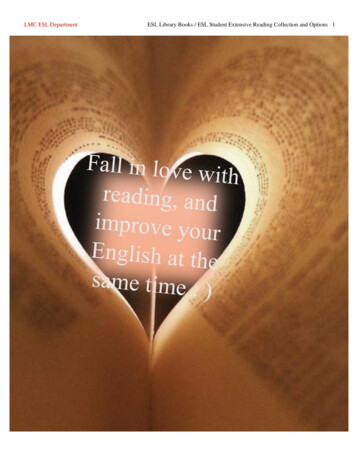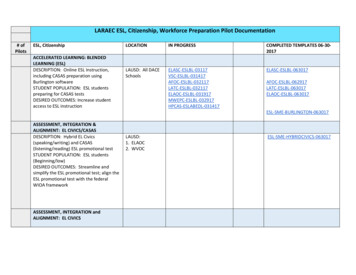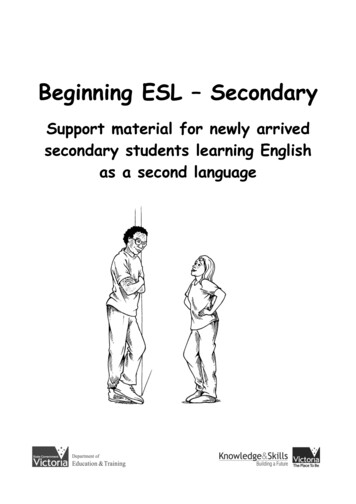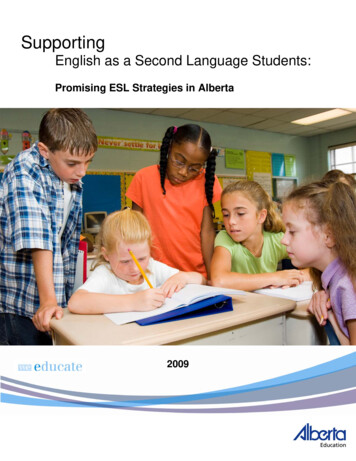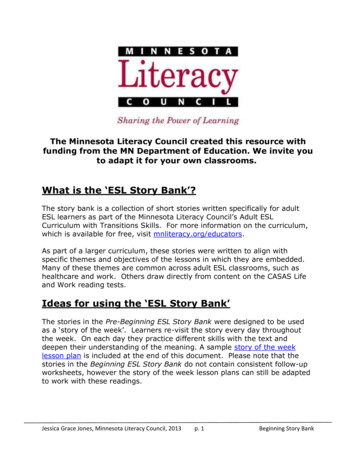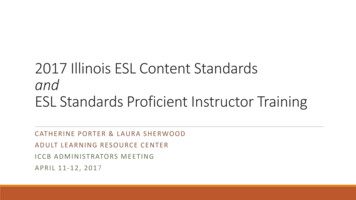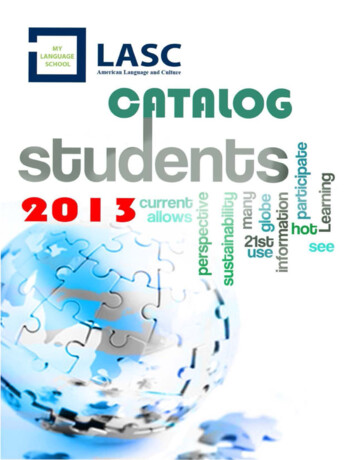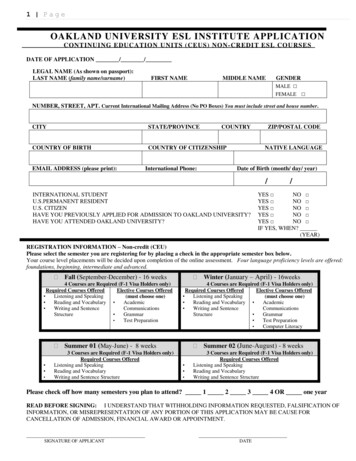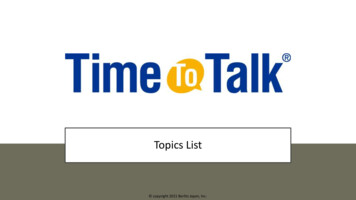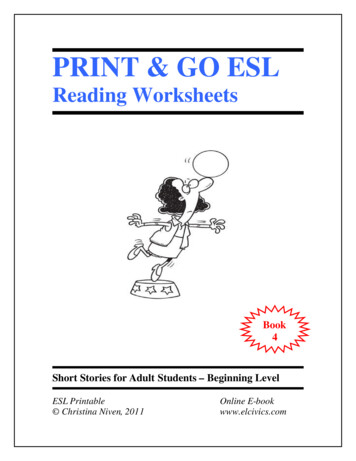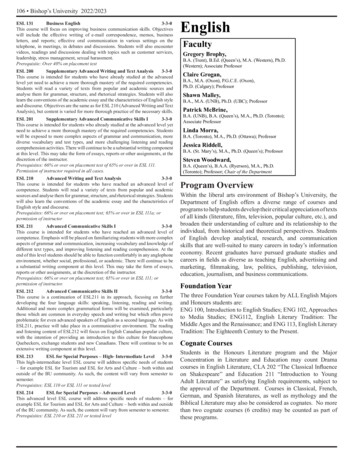
Transcription
106 Bishop’s University 2022/2023ESL 131Business English3-3-0This course will focus on improving business communication skills. Objectiveswill include the effective writing of e-mail correspondence, memos, businessletters, and reports; effective oral communication in various settings on thetelephone, in meetings, in debates and discussions. Students will also encountervideos, readings and discussions dealing with topics such as customer services,leadership, stress management, sexual harassment.Prerequisite: Over 40% on placement testESL 200Supplementary Advanced Writing and Text Analysis3-3-0This course is intended for students who have already studied at the advancedlevel yet need to achieve a more thorough mastery of the required competencies.Students will read a variety of texts from popular and academic sources andanalyse them for grammar, structure, and rhetorical strategies. Students will alsolearn the conventions of the academic essay and the characteristics of English styleand discourse. Objectives are the same as for ESL 210 (Advanced Writing and TextAnalysis), but content is varied for more thorough practice of the necessary skills.ESL 201Supplementary Advanced Communicative Skills I3-3-0This course is intended for students who already studied at the advanced level yetneed to achieve a more thorough mastery of the required competencies. Studentswill be exposed to more complex aspects of grammar and communication, morediverse vocabulary and test types, and more challenging listening and readingcomprehension activities. There will continue to be a substantial writing componentat this level. This may take the form of essays, reports or other assignments, at thediscretion of the instructor.Prerequisites: 66% or over on placement test of 65% or over in ESL 111.Permission of instructor required in all cases.ESL 210Advanced Writing and Text Analysis3-3-0This course is intended for students who have reached an advanced level ofcompetence. Students will read a variety of texts from popular and academicsources and analyse them for grammar, structure, and rhetorical strategies. Studentswill also learn the conventions of the academic essay and the characteristics ofEnglish style and discourse.Prerequisites: 66% or over on placement test; 65% or over in ESL 111a; orpermission of instructorESL 211Advanced Communicative Skills I3-3-0This course is intended for students who have reached an advanced level ofcompetence. Emphasis will be placed on familiarizing students with more complexaspects of grammar and communication, increasing vocabulary and knowledge ofdifferent text types, and improving listening and reading comprehension. At theend of this level students should be able to function comfortably in any anglophoneenvironment, whether social, professional, or academic. There will continue to bea substantial writing component at this level. This may take the form of essays,reports or other assignments, at the discretion of the instructor.Prerequisites: 66% or over on placement test; 65% or over in ESL 111; orpermission of instructor.ESL 212Advanced Communicative Skills II3-3-0This course is a continuation of ESL211 in its approach, focusing on furtherdeveloping the four language skills: speaking, listening, reading and writing.Additional and more complex grammatical forms will be examined, particularlythose which are common in everyday speech and writing but which often proveproblematic for even advanced speakers of English as a second language. As withESL211, practice will take place in a communicative environment. The readingand listening content of ESL212 will focus on English Canadian popular culture,with the intention of providing an introduction to this culture for francophoneQuebeckers, exchange students and new Canadians. There will continue to be anextensive writing component at this level.ESL 213ESL for Special Purposes – High- Intermediate Level 3-3-0This high-intermediate level ESL course will address specific needs of students– for example ESL for Tourism and ESL for Arts and Culture – both within andoutside of the BU community. As such, the content will vary from semester tosemester.Prerequisites: ESL 110 or ESL 111 or tested levelESL 214ESL for Special Purposes – Advanced Level3-3-0This advanced level ESL course will address specific needs of students – forexample ESL for Tourism and ESL for Arts and Culture – both within and outsideof the BU community. As such, the content will vary from semester to semester.Prerequisites: ESL 210 or ESL 211 or tested levelEnglishFacultyGregory Brophy,B.A. (Trent), B.Ed. (Queen’s), M.A. (Western), Ph.D.(Western); Associate ProfessorClaire Grogan,B.A., M.A. (Oxon), P.G.C.E. (Oxon),Ph.D. (Calgary); ProfessorShawn Malley,B.A., M.A. (UNB), Ph.D. (UBC); ProfessorPatrick McBrine,B.A. (UNB), B.A. (Queen’s), M.A., Ph.D. (Toronto);Associate ProfessorLinda Morra,B.A. (Toronto), M.A., Ph.D. (Ottawa); ProfessorJessica Riddell,B.A. (St. Mary’s), M.A., Ph.D. (Queen’s); ProfessorSteven Woodward,B.A. (Queen’s), B.A.A. (Ryerson), M.A., Ph.D.(Toronto); Professor; Chair of the DepartmentProgram OverviewWithin the liberal arts environment of Bishop’s University, theDepartment of English offers a diverse range of courses andprograms to help students develop their critical appreciation of textsof all kinds (literature, film, television, popular culture, etc.), andbroaden their understanding of culture and its relationship to theindividual, from historical and theoretical perspectives. Studentsof English develop analytical, research, and communicationskills that are well-suited to many careers in today’s informationeconomy. Recent graduates have pursued graduate studies andcareers in fields as diverse as teaching English, advertising andmarketing, filmmaking, law, politics, publishing, television,education, journalism, and business communications.Foundation YearThe three Foundation Year courses taken by ALL English Majorsand Honours students are:ENG 100, Introduction to English Studies; ENG 102, Approachesto Media Studies; ENG112, English Literary Tradition: TheMiddle Ages and the Renaissance; and ENG 113, English LiteraryTradition: The Eighteenth Century to the Present.Cognate CoursesStudents in the Honours Literature program and the MajorConcentration in Literature and Education may count Dramacourses in English Literature, CLA 202 “The Classical Influenceon Shakespeare” and Education 211 “Introduction to YoungAdult Literature” as satisfying English requirements, subject tothe approval of the Department. Courses in Classical, French,German, and Spanish literatures, as well as mythology and theBiblical Literature may also be considered as cognates. No morethan two cognate courses (6 credits) may be counted as part ofthese programs.
English 107Double Counting PolicyNo more that 2 courses (6 credits) may be double-counted betweenany English programs.Divisional RequirementsMajors and Honours students in English must satisfy theHumanities Divisional requirements outlined at the beginning ofthe Humanities section of this calendar. Students with programcombinations which require more than 72 credits are exempt fromthis requirement.English HonoursHonours in Literature (60 credits) HONENLThe Honours in English Literature is designed for students whowish to specialize in the study of English Literature, especiallywith the goal of continuing to study the subject at the graduatelevel.Students in this program take at least 60 credits, including:1) The Foundation Year courses (12 credits): ENG 100,ENG102, ENG 112, ENG 1132) The Core course requirement (3 credits): ENG 215,“Introduction to North American Literatures”3) At least 30 credits (10 courses) from the Areas ofSpecialization. Of these 30 credits, twelve credits (4 courses)must be selected from Group A, twelve credits (4 courses)from Group B, and six credits (2 courses) from Group C. Atleast four of the courses in the Areas of Specialization mustbe 300- or 400-level seminars. Students are strongly encouraged to take courses from all ten areas, and are required totake at least two of the areas in Group A and at least three ofthe areas in Group B.Group A:Group B:Group C:Old English and Middle English: 216, 221, 222,310, 315Sixteenth and Seventeenth Century: 223, 224,225, 226, 320, 321, DRA 222Eighteenth Century: 332, 390Romantic: 249, 295, 342, 348Victorian: 254, 255, 350Twentieth-Century British: 250, 251, 258, 360Canadian: 252, 253, 275, 352, 358, 359American: 256, 257, 260, 261, 353Postcolonial: 123, 228, 358, 375Critical Theory: 202, 232, 234, 236, 2394) And five elective English courses (15 credits), at least twoof which must be at the 200 or 300 level or ENG 471 andENG 472 in their stead.As per Humanities Division guidelines, students must attain anaverage of 70%, calculated on the best 60 credits in the program(including cognates) in order to graduate with an Honours degree.Honours in Film and Media Studies(60 credits) HONENFThe Honours in Film and Media Studies is designed for studentswho wish to specialize in these areas, especially with the goal ofcontinuing to graduate studies.Students in this program take at least 60 credits in Film andMedia, including:1) The Foundation Year courses (12 credits): ENG 100,ENG 102, ENG 112, ENG 1132) Three Core Requirements (9 credits): ENG/DRA 170,ENG 279 (formerly ENG 289), ENG 2803) One of ENG 287 or ENG 291 (3 credits)4) Seven Core Electives (21 credits): CDC 100, CLA 150,ENG 124 (formerly ENG 219), ENG 217, ENG 218, ENG 236,ENG 237, ENG 278, ENG 281, ENG 282, ENG 283, ENG 287,ENG 291, ENG 293, ENG 294, ENG 295, ENG 297,ENG 298, ENG 350, ENG 381, ENG 382, ENG 383, ENG384, ENG 463, FRA 250, FRA 259, GER 250, GER 270,MUS 115 (formerly MUS 102), MUS 116, PHI 345, RSC 237,SOC 105, SOC 241, SPA 318, SPA 3335) Five English Electives (15 credits). At least two electivecourses must be at the 200 or 300 level, or ENG 471 andENG 472 in their stead.As per Humanities Division guidelines, students must attain anaverage of 70%, calculated on the best 60 credits in the program(including cognates) in order to graduate with an Honours degree.English MajorsLiterature Concentration (48 credits) MAJENLStudents in the English Major, Literature Concentration, take atleast 48 credits in English, including:1) The Foundation Year courses (12 credits): ENG 100, ENG102, ENG 112, ENG 1132) The Core Required course (3 credits): ENG 215, “NorthAmerican Literatures”3) At least three courses (9 credits) in English Literature before1900, chosen from CLA 202, DRA 222, ENG 115, 216, 217,221, 222, 223, 224, 225, 226, 249, 254, 255, 260, 261, 295,310, 315, 320, 321, 332, 342, 348, 350, 356 and 3904) Eight English electives (24 credits)Film and Media Studies Concentration(48 credits) MAJENFStudents in the English Major, Film and Media StudiesConcentration, take at least 48 credits in English, including:1) The Foundation Year courses (12 credits): ENG 102, ENG112, ENG 1132) ENG/DRA 170 “Intro to Film” (3 credits)3) At least two Core Courses (6 credits) from ENG 279, ENG280, ENG 287, ENG 291
108 Bishop’s University 2022/20234) Five Core Electives (15 credits), chosen from CDC 100,CDC 200, CLA 150, ENG 124 (formerly ENG 219), ENG 217,ENG 218, ENG 236, ENG 237, ENG 278, ENG 279 (formerly ENG 289), ENG 280, ENG 281, ENG 282, ENG 283,ENG 287, ENG 291, ENG 293, ENG 294, ENG 295,ENG 297, ENG 298, ENG 350, ENG 381, ENG 382,ENG 383, ENG 384, ENG 463, FRA 250, FRA 259, GER 250,GER 270, MUS 115 (formerly MUS 102), MUS 116,PHI 345, RSC 237, SOC 105, SOC 241, SPA 318, SPA 3335) And four English Electives (12 credits)English MinorsFor students in any discipline at Bishop’s who, in addition to theirmajor concentration, wish to develop a secondary area of expertisein one of the fields offered through the English Department, weoffer four different minors.The English Minor (24 credits) MINENGThe Literature Minor (24 credits) MINENLThis minor allows students to sample from the many differentaspects and areas of English literatures and film and media studiesoffered through the English department. The English Minorrequires any 8 courses (24 credits) from the department’s List ofCourses.This minor allows students to focus on English literary texts. TheLiterature Minor requires any 8 literature courses (24 credits)from the department’s List of Courses.The Film and Media Studies Minor(24 credits) ENG 283ENG 287ENG 291ENG 293ENG 294ENG 295ENG 297ENG 298ENG 350ENG 381ENG 382ENG 383ENG 384FRA 250FRA 259GER 250GER 270MUS 115MUS 116PHI 345RSC 237SOC 105SOC 241SPA 318SPA 333The Documentary FilmImage and CommunicationFilm TheoryFour FilmmakersFilm ComedyJane Austen and FilmFrom Aliens to ZombiesStudies in Directors/Actors: Alfred HitchcockTechnology, Media and Literature in VictorianEngland.The Evolution of the Fairy Tale in Literature andFilmScreenwritingDigital FilmmakingDocumentary FilmmakingFrench CinemaQuébec CinemaGerman History in Recent FilmsIntroduction to German FilmFilm Music I (formerly MUS 102)Film Music IITopics in Philosophy of FilmFilm and ReligionMedia and Society ICinemaSpanish CinemaHispanic Literature and FilmCommunication and Digital Culture Minor MINCDCMINFIL The Communication and Digital Culture minor offers practicalThe Film and Media Studies Minor provides an introduction tothe study of film through the increasingly rich, interdisciplinaryapproach that now defines this field. Film courses are typicallytaught in the cinema class room (Nicolls 4), which is equippedwith excellent projection and sound equipment, as well ascinema seating. The Film and Media Studies Minor requires thecompletion of 24 credits in the following manner:1) Core Requirements (6 credits): DRA/ENG 170 and ONE ofENG 279, ENG 280, ENG 287, ENG2912) Core Electives (18 credits): Choose SIX courses from thefollowing:CDC 100Introduction to CommunicationCDC 200Communication and Media Studies:Theory and PracticeCLA 150The Ancient World in Film and TelevisionENG 102Approaches to Media StudiesENG 124Introduction to the Graphic Novel(formerly ENG 219)ENG 217The Arthurian TraditionENG 218The Gothic TraditionENG 236Popular CultureENG 237Lessons from the Marvel UniverseENG 278Science Fiction in Literature and FilmENG 279Film History to 1939 (formerly ENG 289)ENG 280Film History after 1939ENG 281Canadian CinemaENG 282Film Adaptationand theoretical instruction in writing and speaking in a variety ofacademic, creative, and professional contexts, including communication, journalism, copywriting, and various modes of digitalproduction. Housed within an English department that preparesstudents as critical readers and effective writers, the Minor worksto “broadcast” these strengths by networking with the rich spectrum of cultural production and critique underway at Bishop’s.Drawing on multiple disciplines, this program develops technical expertise in various modes and media, providing training inthe skills of communication, critique and collaboration that willhelp students to develop confident and compelling voices in theirchosen Students must choose 24 credits from the two categoriesbelow, “Core Requirements” and general “Electives.”Note: Individual departments choose when to offer their owncourses and whether or not to preregister students or limitenrollment. Therefore, it is best to consult the BU Timetable eachsemester in conjunction with the list below, to see which coursesin the minor will be offered.1) Core Requirements (6 Credits): CDC 100 Introduction toCommunication AND CDC 201Writing for Digital MediaOR ENG 116 Effective Writing2) Electives (18 credits). Choose any 6 courses from the following:
English 109General ElectivesENG 116 Effective WritingCommunication and Digital Culture (CDC) ElectivesCDC 200 Communication and Media Studies:Theory and PracticeCDC 400 Senior Professionalization Seminar: PortfolioDigital and Media StudiesENG 102 Approaches to Media StudiesENG 202 History of English LanguageENG 205 Art of Persuasion: Rhetoric fromClassical to ContemporaryENG 236 Popular CultureENG 287 Image and Communication:Visual Culture and CritiqueHIS 275 Digital HistorySOC 105 Media and SocietySOC 280 Interpersonal CommunicationFilm Studies and Film MakingENG 382 ScreenwritingENG 383 Digital FilmmakingENG 384 Documentary FilmmakingJournalism and Sports StudiesENG 285 JournalismENG 286 On-Line JournalismENG 296 Sports WritingSPO170 Social Media and SportSPO370 Public Relations in SportCreative WritingENG 200 Creative Writing: PoetryENG 201 Creative Writing: ProseENG 203 Creative Writing: Experiments in ProseENG 204 Creative Writing: Experiments in PoetryENG 206 Creative Writing: The Graphic NovelENG 209 Introduction to Creative WritingComputer Science/Graphic DesignCS 203 Interactive Web Page DesignCS 301 Computer EthicsCS 330 Developing Mobile Apps (formerly CS230)FIN 218 Digital Imaging for the Artist IFIN 348 Digital Imaging for the Artist IIFIS 182 PhotographyFIS 385 Printmaking: Contemporary PracticeArts Administration, Business Communications andMarketingAAD 252 Arts Administration: Communications and MarketingAAD 150 Arts Administration: Internal Operations (formerlyAAD 250)BMG 345 International Marketing and Export ManagementBMK 211 Marketing ManagementBMK 214 Consumer BehaviourBMK 323 Marketing CommunicationsExperiential Learning (limit 6 credits). Students may onlytake a maximum of 2 courses (6 credits) from this section.ENG 450 Experiential Learning: JournalismENG 456 Experiential Learning: Magazine Editing andPublishingENG 457 Communications: Analysis, Design, andImplementationENG 458 Experiential Learning: Literary Editing and PublishingENG 459 Experiential Learning: Academic Editing andPublishingIndigenous Studies Minor (24 credits) MININDA number of English courses contribute to the IndigenousStudies Minor an interdisciplinary program designed to introducestudents to the global processes of cultural encounters and theresultant responses of resistance, accommodation, and adaption.Students will be exposed to theories and world-wide applicationsof, and responses to, imperialism and colonialism, as well asdecolonization and post-colonialism. For more information on theIndigenous Studies Minor, please consult the program descriptionin the Academic Calendar.List of CoursesCDC 100Introduction to Communication3-3-0This course provides a dynamic introduction to the four pillars of communication—oral, written, visual, performative—and offers effective strategies for success ineach area. The course combines lectures and workshops, modeling the criticalskills in the study of communications while developing the practical skills studentsrequire to claim an active role in shaping the cultural conversation. Units culminatein a series of productions—ranging from public addresses, to web design, topodcasting—that emphasize the public nature of the course’s interventions intoculture, pushing student creations beyond the margin of the page and the classroom.CDC 200Communication and Media Studies:Theory and Practice3-3-0An examination of the forms and theories of communication, this course introducesstudents to critical and practical knowledge of a variety of communicationframeworks, from the nature of the self, to constructive participation in groups.With a focus on the English language and meaning-making (semiology), we willmove outward from the self-concept and self-perception, to the nature of language,listening, non-verbal communication, group communication, and the nature ofpersuasion and power as they apply to language use.CDC 201Writing for Digital Media3-3-0This course introduces students to the world of professional digital writing. Nearlyevery business today requires an in-house team to create internal and externalcommunication strategies for multiple digital channels. This course covers themost common forms of online content production with emphasis on effectivewriting skills and strategies for a variety of media platforms and audiences. Italso considers the effective use of image and sound to promote written materials,teaching students how to reach different audiences through multimediaCDC 400Senior Professionalization Seminar: Portfolio3-3-0This senior professionalization seminar focuses on the development of studentportfolios that showcase the unique experience, education and training of eachstudent in the Communication and Digital Culture program. Coursework willsupport students in crafting an authentic and compelling expression of theirdistinctive vision and values.Prerequisites: CDC 100
110 Bishop’s University 2022/2023ENG 100Introduction to English Studies3-3-0A gateway to English studies, this course challenges students to develop criticalthinking, speaking, and writing about a wide array of texts, from poetry and fictionto television, film and digital media. The course’s workshop structure stressescollaborative work and active engagement with the subject matter through variousforms of creative and critical expression (e.g. creative revisions of poetry, journals,Moodle posts, debates, and short essays). Exercises will isolate and develop thecore critical skills upon which students will depend throughout their studies inEnglish.Note: Students who have received credit for ENG 105 are not eligible forENG 100. Offered every FallENG 101Responding to Literature3-3-0This course will develop the student’s critical thinking, speaking, and writing skillsin response to literary texts in English from a range of genres: primarily poetryand prose. It will develop the student’s knowledge and familiarity with theoreticalapproaches to literature, both intrinsic and extrinsic.Note: Students who have received credit for ENG 106 are not eligible forENG 101. Offered every WinterENG 102Approaches to Media Studies3-3-0Through a close examination of the different forms of contemporary culture peopleare frequently exposed to and consume – movies, TV sitcoms, internet blogs, popmusic, and so on – this course considers how our understandings of reality and ourperceptions about society and our identities are shaped by the various media thatsurround us. Informed by both cultural theory and the history of media, this courseoffers a series of case studies of media texts with the goal of helping studentsunderstand the nature and effects of our contemporary media culture.Offered every WinterENG 104Approaches to Short Fiction3-3-0This course introduces students to the study of fiction through the analysis of shortstories and novellas from various literary traditions and historical periods. Storieswill be discussed in terms of such aspects of fiction as plot, character, setting, pointof view, voice, discourse, tone, symbol, and theme.ENG 108The American Short Story3-3-0This course examines the development of the short story form in the United Statesfrom its beginnings in the work of Irving, Poe, and Hawthorne, through Fitzgeraldand Hemingway, up to such contemporary writers as Oates and Barth. Subjects tobe examined include the Gothic tradition, the influence of Puritanism, the AfricanAmerican experience, gender, and madness.ENG 110English Writers of Quebec3-3-0Selected short stories, novels, plays, and poems of such writers as HughMacLennan, Mordecai Richler, Brian Moore, Joyce Marshall, Ralph Gustafson,David Fennario, A.M. Klein, F.R. Scott, and Irving Layton will be studied. Suchtopics as “English-French Relations,” “The Immigrant Experience,” “MaleFemale Relationships,” “Class Conflicts,” and “The Jewish Experience” will beexamined.ENG 111Canadian Short Story3-3-0This course will examine a wide variety of Canadian short stories, from the latenineteenth century until the present. The authors studied may range from Robertsand Callaghan, to such contemporary writers as Munro, Atwood, Glover, andVanderhaeghe.Offered every yearENG 112English Literary Tradition:The Middle Ages and the Renaissance3-3-0An introductory historical survey of major works and genres of British literaturefrom its beginnings to the Restoration. Students will analyze literary works withintheir historical, social, and cultural contexts. The course emphasizes close readingof individual texts.Offered every FallENG 113English Literary Tradition:The Eighteenth Century to the Present3-3-0This course provides an introductory survey of major works and genres of Britishliterature from the Restoration to the end of the Twentieth century. Close readingof individual texts will be informed by analysis of their historical, social, andcultural contexts.Offered every WinterENG 115Women Writers before 19003-3-0A survey of literature in English by women from the Middle Ages until thebeginning of the twentieth century in the perspectives of feminist critical theory.The course includes poetry, fiction, and nonfictional prose.ENG 116Effective Writing3-3-0Writing is a key competency in communicating across the disciplines. Studentswill read a variety of texts of different genres so as to become familiar with varioustypes of academic and professional discourse. Students will be encouraged toanalyze writing strategies, content, organization, and style with a view to improvingtheir overall writing abilities. Students will also be made aware of different writingsituations, particularly those that may arise in their own disciplines.Prerequisite: Students are normally expected to have achieved a result of at least“5- ” on the EWP Exemption Credit Examination before they attempt ENG 116.Students who need a course in basic writing are encouraged to register in thecourse English Writing Proficiency (EWP 115)Note: Students who have receivedcredit for ELA 116 are not eligible for ENG 116.ENG 118Literature of the Environment3-3-0This course will introduce students to a selection of literature -- fiction, poetry,criticism and literary non-fiction--that deals with the relationship of humans withthe natural world.ENG 123Introduction to Indigenous Literatures in Canada3-3-0This course is an introduction to traditions and innovations in Indigenous literaturesin Canada through textual analysis and an examination of cultural contexts. Theprimary focus will be on contemporary literatures; however, we will also readselections from earlier texts. We will explore how Indigenous writers draw fromEuropean, American, and Indigenous traditions, and how their more recent worksreflect histories of struggle both in style and content. Although written texts willform the core of the course, we may also examine contemporary popular media—especially film—and their representations of the Indigenous.ENG 124The Graphic Novel3-3-0This course will introduce students to the genre of the Graphic novel and willexamine visual rhetoric in literature, history, journalism and popular culture.Possible topics include superhero fantasy, gender stereotypes, sexuality, war,racism and drug abuse.Formerly ENG 219ENG 170 /DRA 170Introduction to Film3-3-0This course provides a broad introduction to the study of film as art. In the firstfew weeks of the course, we’ll familiarize ourselves with the formal dimensionsof Film Studies, exploring how screenwriting, cinematography, editing, lighting,sound, and production design contribute to this collaborative art form. Havingdeveloped this aesthetic vocabulary and understanding, the class will move on toinvestigate different modes of film production (fictional narrative, documentary,experimental), and the critical issues and debates that have shaped the discipline(topics may include genre, auteurism, industry structures, globalization, andideology).ENG 200Creative Writing: PoetryA workshop seminar for students interested in writing poetry.Not open to 1st year students3-3-0ENG 201Creative Writing: ProseA workshop seminar for students interested in writing fiction.Not open to 1st year students3-3-0ENG 202History of the English Language3-3-0A survey of the transformations of the English language from its beginningsto the present studied in the context of the major social, political, and literarydevelopments in English history. The course includes an introduction to basiclinguistic concepts as applied to the study of the English language and an overviewof Canadian English.ENG 203Creative Writing: Experiments in Prose3-3-0A practical course in writing a variety of fiction and non-fiction prose forms. Workwill be edited and critiqued in workshop sessions by peers and the instructor.Not open to 1st year studentsENG 204Creative Writing: Experiments in Poetry3-3-0A practical course in writing a variety of poetic forms. Work will be edited andcritiqued in workshop sessions by peers and the instructor.Not open to 1st year students
English 111ENG 205The Art of Persuasion: Rhetoric, and its Uses and Abuses,From Classical to Contemporary Culture3-3-0This course focuses on the history, theory, and practice of rhetoric acrossdisciplinary boundaries. While exploring texts drawn from philosophy, literature,history, psychology, religion, and politics, we will trace common themes, includinga sustained attention to the deployment of rhetoric to serve various ideologicaland polemical purposes, the ethical dimensions of rhetorical use, and the ways inwhich language seeks to build consensus and create meaning even as it is always atrisk of being destabilized, troubled, or deconstructed. The objectives of the courseare two-fold: 1) to develop a critical acumen for the identification and analysis ofpersuasive strategies in arguments 2) to be able to produce persuasive texts andspeeches informed by classical theories and techniques.ENG 206Creative Writing: The Graphic Novel3-3-0This course further examines graphic novels and other sequential storytellingexamples with an emphasis on applying literary theories to visual rhetoric. Studentswill also learn about Book Arts, and how to exploit all elements of “the book”to create artist’s books. The class will examine theories on graphic storytelling,wordless communication, colour, layout and typography. Students will be re
continuing to graduate studies. Students in this program take at least 60 credits in Film and Media, including: 1)The Foundation Year courses (12 credits): ENG 100, ENG 102, ENG 112, ENG 113 2)Three Core Requirements (9 credits): ENG/DRA 170, ENG 279 (formerly ENG 289), ENG 280 3) One of ENG 287 or ENG 291 (3 credits)
